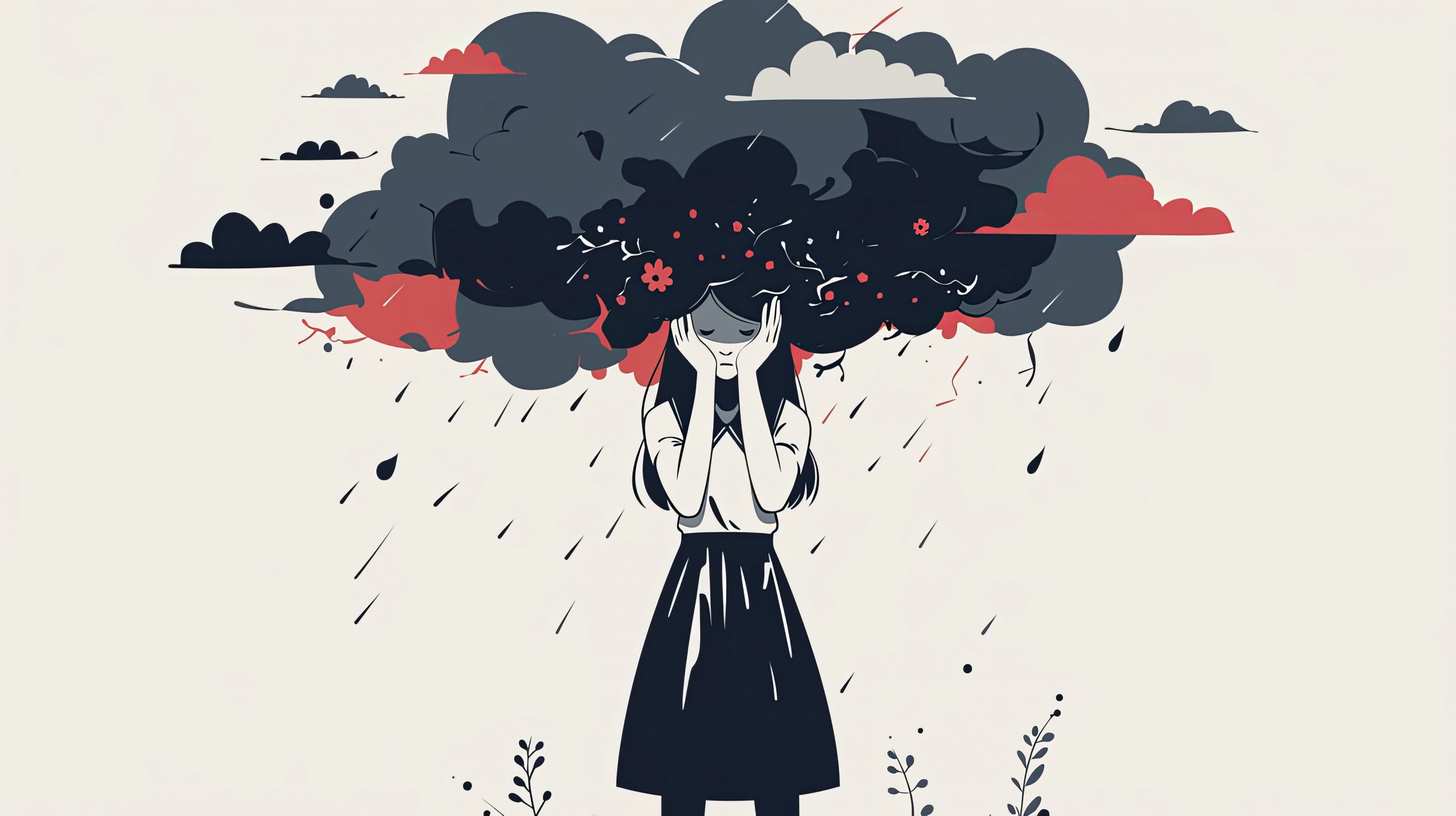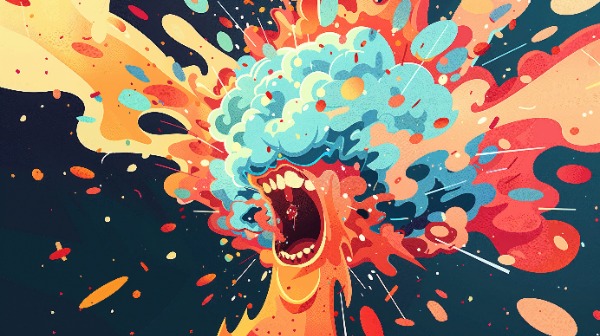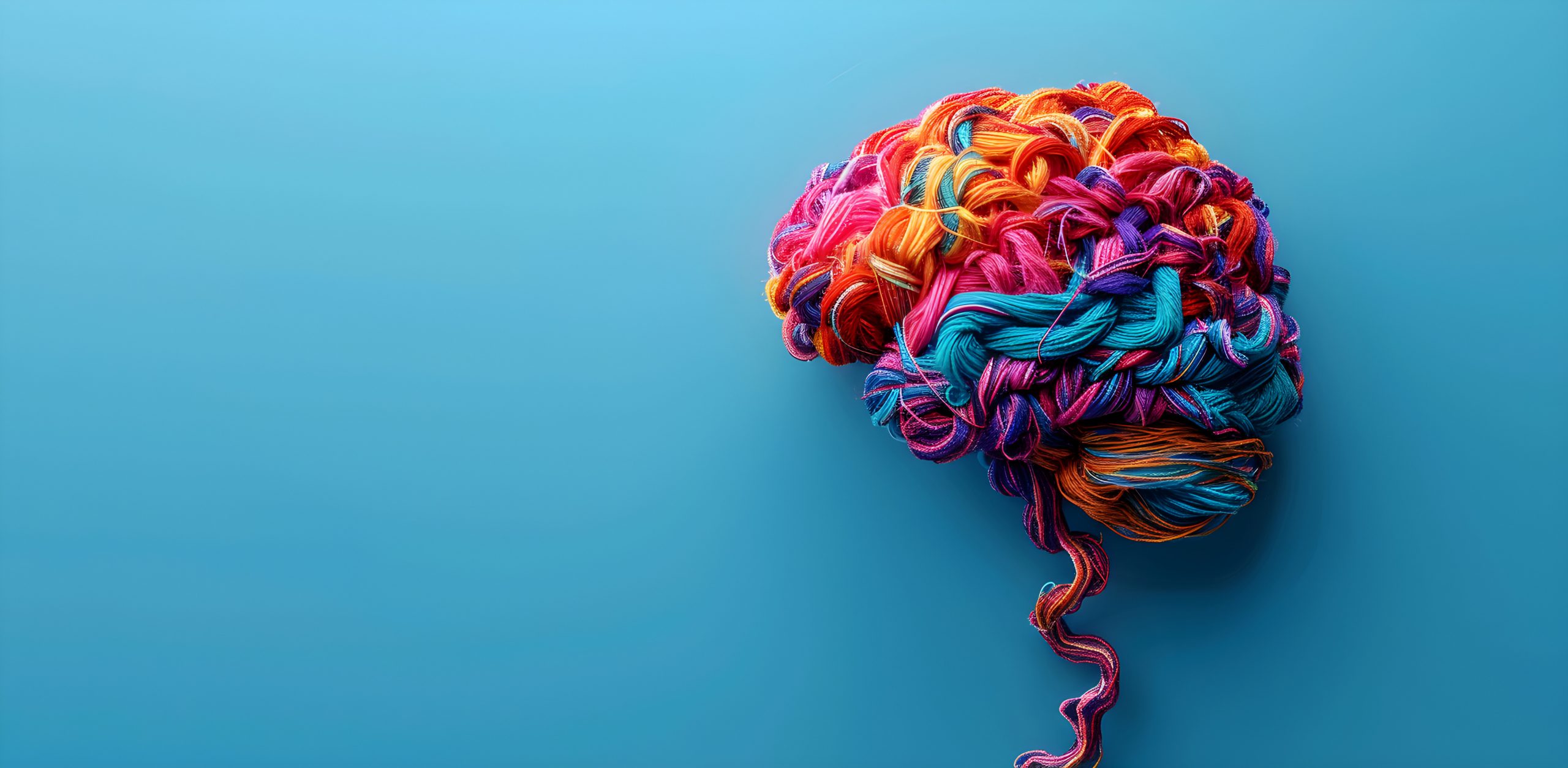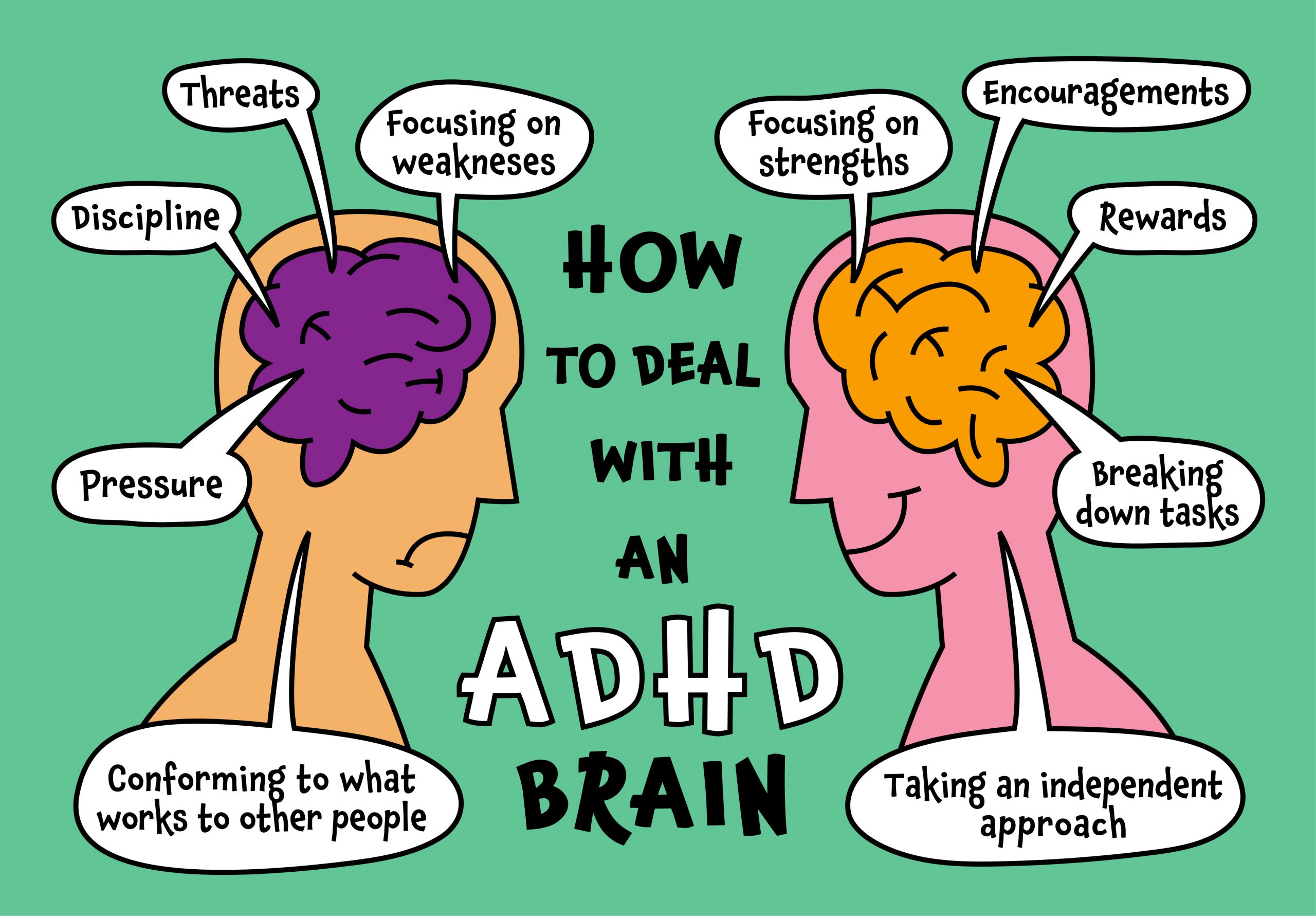Like many people who were diagnosed later in life (ADHD and Autism, at 39 years old) I went through a long process of acceptance, and a rollercoaster of emotions, after my assessment.
I’ve since supported quite a lot of friends and connections through my TikTok presence through their own journey of diagnosis – and am often asked what to expect. I first talk them through the practicalities of the process and what to expect from the actual steps they’ll take, the different stages and forms and questions, and the inevitable loooooong wait they’ll have for their appointment…and then I tell them about the grief.

When I think about the days (weeks, months…) after my own diagnosis, the first thing that comes to mind is always the grief. People are sometimes surprised, because they know that – for me at least – the formality of diagnosis was nothing more than confirmation of something I already knew. That I’d spent the years leading up to it doing my own research, learning as much as I could, and completing multiple online assessments of my own that all told me what was obvious. Knowing all that, surely the official diagnosis was kind of…whatever?
Honestly, that’s what I’d expected: after all – I already knew what I was going to be told, it wasn’t a surprise – but I found myself totally derailed by the emotions that hit me that day. By the process I went through to get there, and the almost four decades I’d lived ‘in hard mode’.
Because that’s what it is. Being neurodivergent. It’s hard. It’s exhausting. And it comes – especially for women and girls (or those assigned female at birth) with an internalising of shame. With the expectations for who we should be, what we should achieve, from the people around us, and the world, community and society that shapes all of us. With guilt, and anger, and sorrow, because everyone else seems to be able to just do the things they need to do, and we just…can’t – and everyone around us finds that frustrating. We find it frustrating. We are called lazy. Told we just aren’t trying, when we feel like all we do is try. We are blamed – and then blame ourselves – for having more potential, and opting not to live up to it. Told that we make excuses. That we are the problem.
Today, the world we live in, the education system and the way people function comes with a lot more understanding – and, importantly, with a wealth of support for those who function differently within it. We know that neurodivergence is common, and that those who have ADHD or Autism need support to function effectively – and that support is, in response, also common…still not as common or easy to access as it perhaps should be, but it’s there. It’s part of how every school, college, university, workplace and service is built. It’s available. But still – because of how research has always been carried out, how diagnostic criteria has been written, how people perceive what neurodiversity is – the systems that are in place have been built around little boys.
There’s an almost global perception of what neurodiversity looks like. When we think ‘autism’ we picture Dustin Hoffman in Rain Man, or Sheldon Cooper of tv show The Big Bang Theory; some kind of academic genius who doesn’t understand the rules of communication or social interactions. When we think ‘ADHD’ we think of naughty little boys who can’t sit still. Even as someone with those diagnoses I’m aware that I still picture those stereotypes, to some degree. So much so that it took me years to recognise that my second child is autistic, because his flavour of autism looks so different to my firstborn, and his needs presented in such different ways. “It can’t be that” I thought “because I know what that looks like…”

I was 39 when I was diagnosed. I – like everyone who was diagnosed so late – had spent my entire life struggling with the impact that ADHD and autism have had on me. On how I function (or don’t…) on my education, my career, my friendships, my relationships, my finances, my health, my entire life.
It was painful. Confusing. Frustrating. Lonely. It was lonely.
I spent my childhood baffled by other children. Feeling like an alien. There’s a story from the day I was born, that my Mother has always told; that she’d spent her whole pregnancy picturing who I would be, and had named the ‘little English rose’ she was expecting Jennifer, and she knew who I was…but the moment I was placed into her arms, furious and pink and new, with a shock of jet black hair and eyes that said I’d been here before and wasn’t impressed to have returned, she thought “oh…you’re not Jennifer!”
The baby she had pictured, and the little girl she would become, wasn’t who she met – and she told everyone that I wasn’t her Jennifer: that I was a changeling. A stranger. She couldn’t give me the name she’d planned, because I wasn’t her baby. And so I became Lizzie. (My Mum’s parents lived on a farm at the time, and had multiple barn cats who lived in a complicated society – my Nanny B named most of the female cats on variations of the Queen’s name: Libbie, Betty, Lillybet, and Lizzie – and I’m fairly sure that wild barn cat was the inspiration for my own name!)
Being told this story my whole life, like an amusing anecdote, made sense to me. It explained why I always felt different. Like an outsider. Like an alien who’d been mistakenly dropped into this life. Like the changeling child that had tricked my Mum, swapped out for the daughter she was suppposed to have.
I know now that this sense of not belonging is common in neurodivergent women and girls; that most of us will question whether we’re even real, because we can’t connect or feel that we belong in the life we are living, because nothing makes sense. Everyone else seems to understand what the rules are, to find it easy to make friends, to connect to each other – and I just couldn’t. I would study the children around me, as far back as I can remember, and try to learn the rules of this whole thing; the rules that nobody ever explained, but everyone else just somehow knew – but it also felt like they were always changing them. Like the moment I understood them, learned them, worked out how I was supposed to be, the lines would shift, and I’d be on the outside of it again.
In schools there are SEN teams, teachers who make allowances, there is support and education and understanding, for the little boys who have ADHD, for the autistic kids, that protect them. They get additional help, support, compassion, and are able to function better because of it. But I didn’t get any of that. I got told I was brilliant – that I was super smart, capable of excellence, that I ‘had a lot of potential’ – and then alongside it, I was told that I was lazy. That I was letting everyone down. That I just needed to try harder.
I found that incredibly painful – and confusing. Because I felt like all I ever did was try. That I was trying all of the time, every day, constantly, and was exhausted by doing so, but that no matter how much I DID try, it was just never, ever enough. Never good enough. I never got there.
I felt like a failure. All the time. Constantly. And like I needed someone to just tell me how to be a real person. That it was my fault, when I didn’t achieve perfection in everything, every time. Maybe I was lazy? Maybe this was all my own choice, and I was just…a shitty person?
I still carry that. Still feel it. And am still told it – regularly. Told that I let people down. That I fail. That I am selfish, lazy, and making excuses.
People who know that I’m diagnosed – that I am an adult woman with ADHD, an autistic woman, a neurodivergent woman who needs support and has various challenges, needs and executive dysfunction that I’m endlessly fighting to control – tell me that it’s “just my latest excuse” or “a convenient buzzword.”
I’ve been told that I’m “just desperate for a label” and that I use it as an excuse not to “be an adult”.
Since I was a child, all the way through my more than four decades on this planet, I have had moments of excellence. Of brilliance. I was labelled ‘gifted’. I have a Mensa level IQ. I did the 11+ a year early, scored in the top 2% of results in the entire UK for that year. Was offered a full scholarship to private school (that, for reasons never really explained to me, I didn’t take up…) I was hyperlexic, reading well ahead of my peers. I was constantly asking questions, talking at people, bombarding them with my need to know everything. I was brilliant. But I was also…useless. I was tired. Overwhelmed. Didn’t do homework, didn’t learn my spellings, didn’t finish projects, didn’t complete tasks, didn’t get good grades, didn’t meet deadlines…

I learned, quite early, that if I wasn’t perfect – if I didn’t get the best grades, didn’t come tippity top of the class, wasn’t 100%, A*, number one brilliant, I wasn’t praised. That no matter how much I tried, that was an impossible goal. That, because failing to achieve perfect was inevitable, and that ‘very good’ wasn’t good enough (for anyone else, or for the voice in my own head) that I was a failure. Not just that I’d failed – that I am a failure. That I am not good enough, because I ‘should have done better’. That if I put the effort in, did the work, tried my best, and didn’t reach ‘the best and most perfect’ I would be told it was disappointing. That I’d let them down. Let myself down. That my effort wasn’t the point, because the result was failure – so what was the point in trying? Why push myself, hurt myself, exhaust myself, burn myself out trying to be the best if I was going to be criticised anyway? And why put myself through all that when I could just coast along on the fact I was smart, and most stuff was easy for me, and could still get the Bs and Cs other people were so celebrated for?
If I would be criticised either way – criticised when I tried for not trying enough, criticised when I didn’t try because I ‘could have done better’ – it felt like a waste of my time, my energy, my capacity and my emotional vulnerability, to put myself through it. Nobody cared or listened to me explain how hard I’d tried or what I’d achieved, because even if I got 10 A*s and one C, the C was the only thing anybody saw. The only thing that mattered to them.
If I was fighting, every single day, just to cope, just to survive, just to try to understand the world I was meant to be part of, and nothing I did, said or was could ever be enough, and I was so tired with it all, why keep putting myself through it? If everyone already thought I was a lazy person, that I didn’t want to ‘reach my potential’, how could I keep arguing it? How could I believe that I wasn’t lazy and wasn’t a failure, a burden, a let down, if I kept apparently proving that I was those things?
Clearly, I was the problem; every time I’d tried to explain, argued, pushed back, tried to get someone – anyone – to understand that I was trying – I was trying but it was too HARD, I would be told I was lying. If everyone saw it, said it, they must be right.
So that became what I believed. What I embodied. What I was. How could it not? How could anyone not internalise and absorb that feedback, when it was so consistent? How could I believe anything else?
The worst part about this internalised guilt and shame is that it’s true. To some extent, there IS a part of us that thinks “why bother, if I’m going to mess it up anyway”. A part that quits something before we start it, because we think failing is inevitable…
And that grief?
The grief, when we are diagnosed, when we get confirmation that we aren’t crazy, aren’t lazy, didn’t choose to feel this way, function this way (not function this way…), that we really have been living life in hard mode, have been blamed and criticised for things we had absolutely no control over, were fighting against the tide in every step we took, that we needed help that whole time and nobody helped…it’s huge. Vast. Infinite.
The grief that this whole time there was an explanation. This whole time there was a reason. This whole time I was right; I needed help. That other people got that help. That there was help, that whole time, but nobody saw me. Nobody saw that I needed it. Nobody heard, or believed, or stepped in, nobody helped because they were too focussed on it being my fault.
I was a child.
I was a vulnerable, neurodivergent, struggling, lonely, broken child. I was a child.
And then I wasn’t: then I was a young adult, then just an adult, and still struggling with the same things, and still being blamed, internalising that blame, failing and being a failure…because I didn’t know. I didn’t know that it wasn’t anxiety, wasn’t depression (though of course it was both of those things too) that it wasn’t laziness or failure or choice or behaviour or something I was doing, or not doing – it was a real, legitimate, life long, recognised issue that people know about, that there is help for, medication for, support for, and that not only was I on the outside of ‘normal people’ I was also on the outside of ‘people like me’ because not one person ever suggested or recognised that there was something else going on that they could help me with.
The day of my assessment, my diagnosis, I – unusually, apparently – left that room with a prescription in my hand. Elvanse. Stimulant medication. I started it the very next morning. It’s not like a magic pill that changes who I fundamentally am, as a person – but it does help. It makes thoughts come one at a time. It means I can start a task and finish the task. It makes the fizzing, endless, overwhelming noise inside my head less loud. It makes me more “normal”.
And although I felt relief, gratitude, pride and pleasure in the changes that I’ve been able to make, because I’m on this medication, it also came with – guess what – even more grief.
More grief, because this whole time? This whole time, this is what other people experience? Just…this? All the time? This easy? THIS is how “normal” people function? Think? Act? Process?
One at a time?
One thought at a time? Are you kidding me?!
Jesus fucking Christ.
It’s been over two years since my diagnosis. Two years, filled with all kinds of other events, issues, challenges, joys, changes, wonder. Two years – most of all – of grief.
So when people ask me “what is getting diagnosed like?” or “why bother, if you’ve been ok before?” that’s what I tell them.
That I wasn’t ok. That the little girl I once was, the teenager I became, the young woman who felt like she was drowning, the adult I became, the mistakes she made – I made – were never ok. I wasn’t ok.
And now?
I’m a lot more ok than I was – and that grief has changed shape. I’ve processed and accepted a lot of it…but if I spend any time thinking about all those years, and everything I went through, that perhaps I didn’t need to go through, the grief comes over me again.
That’s why I want to write about this. Why I want to speak about this. Why I need to share my own experience, connect with other neurodivergent women, learn more, understand more, do more training…so I can help myself to be the best version I have within who I am – and so that I can help others to do the same.

No responses yet